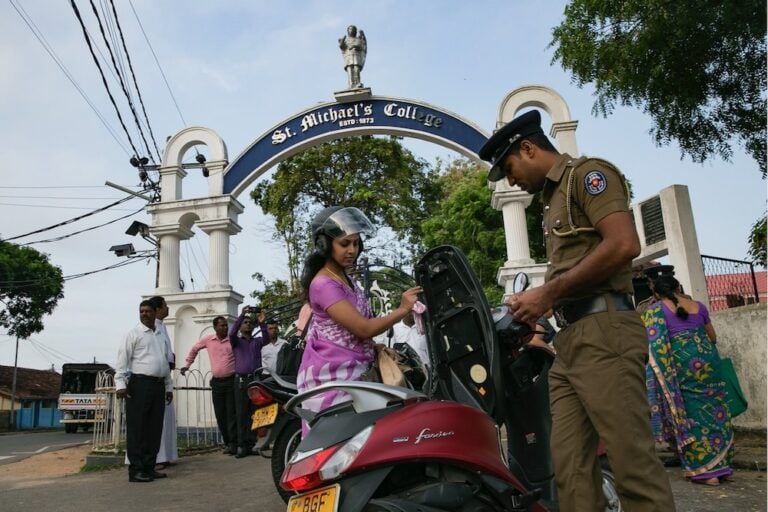(FMM/IFEX) – The following is a 24 January FMM special report: Situation of Media and Journalism in the Jaffna Peninsula The situation of the media and journalism in Jaffna deteriorated considerably in 2006. Six media workers have been killed since 2005. A well-known journalist, Nimalarajan, was killed in Jaffna in 2000. Impunity remains the order […]
(FMM/IFEX) – The following is a 24 January FMM special report:
Situation of Media and Journalism in the Jaffna Peninsula
The situation of the media and journalism in Jaffna deteriorated considerably in 2006. Six media workers have been killed since 2005. A well-known journalist, Nimalarajan, was killed in Jaffna in 2000. Impunity remains the order of the day in Jaffna with regard to all these killings.
Journalists face increasing challenges in reporting killings, abductions and disappearances, most of which are carried out for political and military reasons with the complicity of sections of the military. It is so bad that others shun those who have suffered the brunt of violence in their communities, for fear of being seen to be partial to and in support of the redress of human rights violations.
The fighting and tense situation that have emerged since 11 August 2005 have paved the way for a considerable number of journalists and media workers to leave the field. After the murder of the managing director of “Namathu Eelanadu”, the newspaper closed down. (The deceased was a member of the Tamil National Alliance and a former Member of Parliament. It is widely believed that Tamil nationalist forces supported “Namathu Eelanadu”).
Collecting first-hand information or reporting about the prevailing situation is severely restricted because of growing fears for personal security. For example, if a journalist reports the situation of shops and businesses being closed for a long period because of growing violence on the ground, they may face pressure from both the army and the Liberation Tigers of Tamil Eelam (LTTE).
Most of the tsunami reconstruction projects have been stopped due to the economic embargo and the security situation. However, the relevant officials are not prepared to expose this situation, fearing reprisals. Journalists are disappointed and fed-up with this attitude, but, in fact, both parties are victims of the general deterioration of on-the-ground conditions.
The culture of impunity and fear combine to create a deeply disturbing context on the ground for journalists. After any security-related incident, no one is ready to give details or information about it, leading to a situation where rumour and speculation are widespread.
Journalists in Jaffna are prevented from engaging in the normal practice of news gathering and photographing events. Theirs is a diurnal struggle for news and livelihood. On account of the abnormal delays incurred in reporting the situation on the ground, access, when granted, only leads to a situation in which it is too late for journalists to gather the information necessary to report in a responsible and accurate manner.
The curfew and the lack of transport facilities also affect journalists’ ability to carry out their duties. Normal day-to-day activities in Jaffna come to an end around 4:00 p.m. (local time), by which time journalists are forced to finish their work as there is no means of transport after that to return home. As a result, there is a rush to get onto the last bus, with delays at checkpoints common and traffic halted for military operations or security reasons – exponentially increasing travel time and the burden of commuting to and from offices.
Queues for essential items like rice, soap, coconut oil, dairy products, petrol, ceresin, mosquito coil and clearance for air or ship transport have been exacerbated after the closure of the A9 route connecting the Jaffna peninsula to the rest of the island. There is no special consideration given to media personal in the distribution of essential items.
Lack of communication facilities is a central obstacle for journalists in the peninsula. The office of Sri Lanka Telecom is not willing to supply telecommunication facilities for journalists. As a result, journalists are forced to rely on mobile phones that are more expensive to use than landlines. When the government terminated mobile phone services in the Jaffna peninsula for nearly five months until early this month, journalists were forced to travel long distances to use telephone facilities where available. On occasion, they were forced to travel through checkpoints to access communication centres. E-mail and Internet facilities are also restricted in the peninsula – whenever curfews are imposed, Internet (cyber) cafes close down and journalists are cut off from the rest of Sri Lanka and the world.
Three newspapers are published in Jaffna after the closure of “Namathu Eelanadu”, and they are struggling to publish due to the lack of newsprint and plates that are used in offset printing. There are only four pages to each newspaper, sold for 10 rupees, with half the pages filled with advertisements. The number of copies printed has also been reduced drastically due to the lack of resources. All newspapers publish only four pages now. Soon, they will only be able to publish two pages – and even that, only until the end of February.
National-level newspapers are not available in Jaffna except “Thinamurasu”, published by the Eelam Peoples Democratic Party (EPDP), a former Tamil militant movement, now a partner in the incumbent government.
There is virtually no entertainment in the form of art and cultural activity or the representation of either in the media. A civilian population denied entertainment is forced to face continuously their singular plight, which is a cause of psychological trauma and the further hardening of hearts and minds between communities in the peninsula and the rest of the country.
Young, courageous journalists continue to report and consider the current situation as a challenge they need to face and overcome. However, the fear persists – they are scared to identify themselves as journalists at checkpoints and face severe reprisals if perceived to be partial to either the army or the LTTE.


